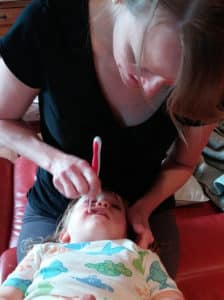My Toddler Won’t Let Me Brush Her Teeth! What Can I Do?
My Toddler Won’t Let Me Brush Her Teeth! What Can I Do?
Your toddler and her teeth – how can you brush them without a battle? This is one of the questions we get asked most often. Toddlers are not known for being the most cooperative of creatures, especially when it comes to things they don’t understand or don’t want to do.
We can empathize – truly. Dr. Kucera has a toddler. They are at once adorable and intractable.
So what is a parent to do when faced with a toddler with jaws that are locked, or one who is screaming at the top of his lungs?
We assume you began cleaning your baby’s teeth and gums with a bit of gauze at around 6 months of age and began using an infant toothbrush as soon as those tiny teeth erupted. By doing this, you weren’t only preventing tooth decay; you were also preparing your child for the lifelong act of brushing. His or her first birthday is a great time for that first dental visit also.
 Once toddlerhood is reached, your little one can usually spit, so a small amount of toothpaste may be used. (Make sure your toddler isn’t swallowing the toothpaste). Toddlers don’t have the necessary fine motor skills, or the desire, to brush their own teeth. This will be up to you.
Once toddlerhood is reached, your little one can usually spit, so a small amount of toothpaste may be used. (Make sure your toddler isn’t swallowing the toothpaste). Toddlers don’t have the necessary fine motor skills, or the desire, to brush their own teeth. This will be up to you.
Here are a few suggestions:
- Make brushing a regular ritual that seems like fun! Lay out your toddler’s toothbrush as you get your own ready. Children love to mimic. If your toddler sees you brushing your own teeth every night, he or she will be much more likely to understand that it’s simply part of getting ready for bed. While you are brushing, talk about the importance of getting all the sticky bacteria off your teeth and make it sound like its great fun. Mention how wonderful your teeth feel and look when you are finished!
- Have a few fun toothbrushes for your toddler, and let her choose which one to use.
- How you ask can allow her to feel she has some independence. You might ask “Which toothbrush would you like to use?” instead of “Are you ready to brush your teeth?” or “Do you want to brush your teeth?” She’ll feel involved in the decision and be more likely to cooperate.
- Using a (separate) toothbrush, brush the teeth of each of your child’s favorite toys after you brush your own. Talk about how important it is that ‘Teddy’ or ‘Dolly’ takes care of their teeth, so they have beautiful smiles. Most toddlers, upon seeing how much ‘Teddy’ loves having his teeth brushed, will want theirs done also.
- Offer small rewards for challenging toddlers after brushing – like stickers, reading a favorite book afterward, or holding a special toy.
- If your toddler isn’t impressed with any of these methods, try using a piece of gauze to rub on his teeth. There are some pre-formed gauze pieces just for this purpose. If your Pediatric Dentist recommends using a fluoride toothpaste once a day, just a dab is all that is necessary.
- Let your toddler pick out her own toothbrush at the store. Toddlers are trying hard to be independent, and many are excited at the prospect of being able to make such a decision.
- Use a tooth brushing chart. We have one in our ‘Just For Kids’ section on our website, which you can print and post for your child to see while he brushes.
- Some toddlers just won’t cooperate. It’s perfectly normal as they begin to see themselves as individuals with their own opinions. Have your child lie down with her head on your lap. This will give you a great view of her teeth and gums while you brush. Tell her how beautiful her smile is, how clean and perfect her teeth are. Try to stay positive, even if your toddler is screaming her head off.
- Understand that brushing a toddler’s teeth isn’t always a quick process. If your toddler is clenching his teeth shut, be tenacious – he can’t do this forever. If she screams every time you approach with a brush, just pretend you don’t notice and brush her teeth like normal. Eventually, she’ll understand that screaming doesn’t have the desired effect.
Everything with toddlers takes longer – getting dressed, mealtime, travelling, and brushing teeth. Understand this and be persistent – there is no choice if you want your child to have healthy teeth and gums for life.
By the time your child has reached 5 or 6, he can usually brush independently, although he may not yet have the fine motor skills necessary to floss properly. He’ll need you to check often to be certain he isn’t missing any key areas.
Most importantly, bring your toddler in for regular visits to the Pediatric Dentist. We can often help with ideas or suggestions for getting your toddler to be happier about having good oral health habits!













